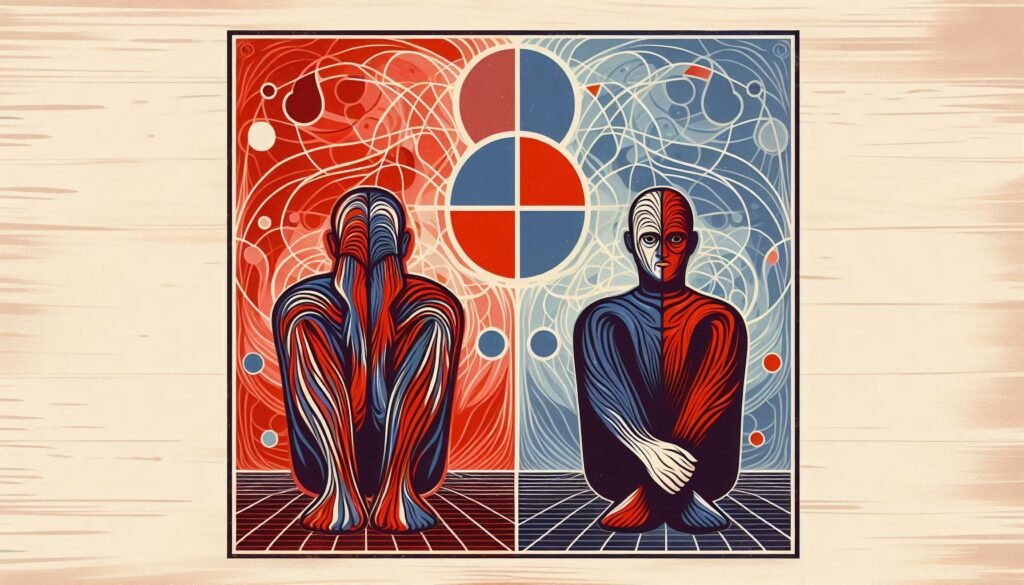Understanding personality traits can be a fascinating journey into the human psyche. Among these traits, neuroticism and introversion often spark intriguing conversations. While both are recognized as distinct aspects of personality, they frequently get intertwined in discussions about behavior and emotional responses.
Neuroticism refers to the tendency to experience negative emotions such as anxiety, depression, and irritability. Conversely, introversion is characterized by a preference for solitude and introspective activities over social engagements. At first glance, these concepts may seem unrelated; however, delving deeper reveals surprising similarities and differences that shape how we navigate our lives.
In this article, we’ll explore what sets neuroticism apart from introversion while highlighting their interconnectedness. From emotional reactivity to career implications, understanding these dimensions can lead us towards greater self-awareness and improved interpersonal relationships. Join us as we unravel the complexities of neuroticism and introversion: similarities and differences!

Defining Neuroticism and Introversion: Distinct Personality Dimensions
Neuroticism is one of the five major personality traits identified in psychology. It reflects a person’s emotional stability and tendency to experience negative emotions. Individuals high in neuroticism may often feel anxious, moody, or easily stressed. This trait can influence how people respond to challenges and manage their emotions.
Introversion, on the other hand, describes a preference for solitary activities over social ones. Introverts tend to recharge by spending time alone rather than seeking out social interactions. While they may enjoy deep conversations with close friends, large gatherings can be draining for them.
These two dimensions have distinct characteristics but also intersect at times. Both neurotic individuals and introverts might require solitude for different reasons—neurotics may seek it to avoid overwhelming feelings while introverts embrace it as a way to rejuvenate.
Understanding these definitions helps clarify how each trait influences behavior and interaction styles. Recognizing these differences is key for personal growth and fostering better relationships with others.
The Neurobiological Foundations: Brain Structures and Neurotransmitters
Neuroticism and introversion have distinct neurobiological underpinnings. Neuroticism is often linked to sensitivity in brain structures such as the amygdala, which processes emotions. Increased activity in this area can lead to heightened emotional responses and stress.
On the other hand, introverts may show different patterns of brain activation. Research indicates that they often utilize areas associated with deeper cognitive processing rather than immediate reactions. This suggests a preference for reflection over impulsivity.
Neurotransmitters also play a crucial role in these personality traits. For instance, serotonin levels are commonly associated with mood regulation; lower levels can contribute to neurotic behaviors like anxiety and depression.
Dopamine contributes to reward processing and motivation, influencing how individuals seek social interactions or avoid them based on their personality type. These chemical messengers create unique emotional landscapes for both neurotic and introverted individuals, impacting their daily experiences significantly.
Emotional Reactivity: Comparing Neurotic and Introverted Responses
Emotional reactivity is a critical aspect of both neuroticism and introversion. Neurotic individuals typically experience heightened emotional responses. They may feel anxiety, sadness, or irritability more intensely than others. This tendency can lead to rumination over negative events or feelings.
In contrast, introverts often process emotions differently. While they might not exhibit the same level of intense reactions as neurotics, their emotional responses can be profound yet subdued. Introverts tend to reflect internally before expressing feelings outwardly, which can give rise to deep insights but also prolonged periods of contemplation.
Both personality types face unique challenges in managing their emotions. Neurotic individuals may struggle with overwhelming feelings that affect daily functioning, while introverted people might grapple with social situations that drain their energy even if they don’t show strong emotionality outwardly.
Understanding these differences helps clarify how each type navigates life’s ups and downs emotionally. Recognizing these patterns fosters empathy and better communication between friends and loved ones who embody these traits.
Social Interactions: How Neuroticism and Introversion Shape Relationships
Neuroticism and introversion significantly influence how individuals engage in social interactions. Neurotic individuals often experience heightened emotional responses, which can lead to anxiety or excessive worry in social settings. This sensitivity may cause them to perceive situations as more threatening than they actually are, leading to avoidance of certain social gatherings.
On the other hand, introverts tend to prefer solitary activities and small group interactions over larger ones. They often feel drained after extensive socializing and require time alone to recharge. While their withdrawal may be misinterpreted as shyness or disinterest, it’s a crucial aspect of how they navigate relationships.
Both personality traits shape communication styles as well. Neurotic individuals might express their feelings vocally but struggle with conflict resolution due to fear of negative outcomes. Introverts may choose their words carefully, focusing on deep connections over casual chatter.
Understanding these differences is essential for fostering empathy within relationships. By recognizing each other’s tendencies, friends and partners can create supportive environments that cater to both neuroticism and introversion.
Stress Management: Coping Mechanisms in Neurotic and Introverted Individuals
Neuroticism and introversion often influence how individuals manage stress. Neurotic individuals tend to experience heightened emotional responses, making them more prone to anxiety and negative feelings. This can lead to coping mechanisms such as rumination or avoidance behaviors, which may provide temporary relief but can exacerbate stress in the long run.
Introverted people, on the other hand, might prefer solitude when faced with stress. They often recharge by spending time alone rather than seeking social support. While this can be beneficial for processing emotions internally, it might also result in isolation during tough times.
Both personality types share a tendency toward self-reflection but use it differently. Neurotics may dwell excessively on problems while introverts analyze situations quietly without external distractions.
Recognizing these differences is crucial for effective stress management strategies tailored to each personality type’s strengths and weaknesses.
Cognitive Processes: Attention, Perception, and Decision-making Differences
Cognitive processes play a crucial role in how we experience the world, and neuroticism and introversion influence these functions distinctly. Individuals high in neuroticism often exhibit heightened emotional sensitivity. This can lead to an increased focus on negative stimuli, making their attention more prone to distractions related to potential threats or stressors.
Conversely, introverts tend to excel in deep thinking and reflection. Their cognitive style may prioritize detailed analysis over rapid response. This preference for solitude allows them time for introspection, which enhances their perception of complex ideas but may limit responsiveness in dynamic social situations.
Decision-making also varies significantly between the two traits. Neurotic individuals might face indecisiveness due to fear of failure or concern about repercussions, leading them to second-guess their choices frequently. Introverts, however, are likely to approach decisions methodically by weighing options carefully before reaching conclusions.
Understanding these differences is vital for personal growth and effective communication with others who possess varying personality traits.
Career Implications: Impact of Neuroticism and Introversion on Professional Life
Neuroticism and introversion can significantly shape professional experiences. Individuals high in neuroticism often experience heightened anxiety and self-doubt, which may affect their job performance. They might struggle with stress management during tight deadlines or high-pressure situations, leading to burnout.
On the other hand, introverted individuals tend to excel in roles requiring deep focus and independent work. Their preference for solitude can lead to greater productivity when tasks require concentration without frequent interruptions. However, they might avoid networking opportunities or group activities that are essential for career advancement.
In team settings, neurotic employees could express concerns more frequently than their colleagues, potentially fostering an atmosphere of apprehension. Conversely, introverts may bring valuable listening skills but could miss chances to voice innovative ideas due to shyness.
Employers must recognize these traits’ impacts on collaboration and leadership styles. Creating a supportive environment tailored toward different personality types can enhance workplace dynamics while leveraging each individual’s strengths effectively.
The Ambivert Spectrum: When Neuroticism and Introversion Overlap
Ambiverts occupy a unique position on the personality spectrum, blending traits of both introversion and extroversion. When considering neuroticism, ambiverts may exhibit fluctuating emotional responses that can mirror those found in more neurotic individuals. This complexity allows them to adapt their social behaviors depending on context.
For example, an ambivert might feel energized in social settings one day but drained the next. Their neurotic tendencies could lead to heightened sensitivity in these shifting states, influencing how they interact with others. This adaptability is often accompanied by a rich inner world shaped by introspection.
While introverts may lean towards solitude for rejuvenation, ambiverts possess the flexibility to engage socially when needed. However, this fluidity does not exclude them from feelings of anxiety or self-doubt characteristic of higher levels of neuroticism.
Understanding where someone falls on this spectrum can illuminate their coping strategies and interpersonal dynamics. Recognizing these nuances enhances our appreciation for diverse personality expressions and interactions.
Personality Development: Nature vs. Nurture in Shaping These Traits
Personality development is a complex interplay between genetic predispositions and environmental influences. Neuroticism and introversion are no exceptions to this rule. Genetics can provide a foundation for these traits, suggesting that some individuals may be biologically inclined toward higher levels of anxiety or lower sociability.
However, the environment plays an equally pivotal role in shaping personality. Childhood experiences, family dynamics, and cultural contexts significantly impact how neuroticism and introversion manifest. For example, a supportive upbringing may help mitigate the effects of inherent neurotic tendencies.
Additionally, social interactions contribute to personal growth. Engaging with different people challenges one’s comfort zone and can either reinforce or diminish introverted characteristics over time. This dynamic leads us to understand that nurture often tempers nature’s influence.
In essence, while genetics lays the groundwork for personality traits like neuroticism and introversion, life experiences ultimately sculpt their expression in each individual’s journey through life.
Embracing Uniqueness: Strengths and Challenges of Neurotic and Introverted Individuals
Understanding neuroticism and introversion reveals a rich tapestry of personality traits that define how individuals interact with the world. Both dimensions come with unique strengths and challenges, shaping experiences in profound ways.
Neurotic individuals may excel in creativity due to their heightened emotional awareness. Their sensitivity allows them to tap into feelings deeply, often leading to innovative thinking. However, this same trait can result in anxiety and overthinking, which hinders decision-making.
On the flip side, introverts possess remarkable listening skills and an ability to focus deeply on tasks. They are often reflective thinkers who prefer meaningful conversations over small talk. Yet, they might struggle with social interactions or networking situations where extroverted behaviors dominate.
Embracing these traits means recognizing that both neuroticism and introversion contribute positively to our diverse society. By understanding ourselves better through these lenses, we can navigate life more effectively while celebrating what makes us unique. Each trait brings its own flavor to human experience; acknowledging this diversity is essential for personal growth and fostering harmonious relationships within our communities.


